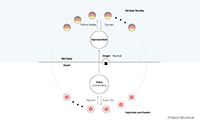Onigiri for Berlin
How to prevent economic superiority from causing mental dominance
The social practice investigates how to disentangle perceived economic preeminence and sense of relative mental superiority in social relations. We propose to tackle the problem of poverty and homelessness in a counter-hegemonic manner that overcomes economic inequality, but does not create the mental state of superiority and inferiority within the society.
To prevent stigmatisation and actualization of the poor-rich binary opposition, we move away from the existing social relations within German society and build new ones. New social relations aim to improve the financial situation of the poor without creating subordination-domination mental opposition. Social relations are formed exclusively in an economic, non-normative and post-colonial context, to avoid the influence from existing historical identities of the social groups. The present case sheds the light onto two social entities: the poor in Berlin (beggars and metro musicians) and the users of Japanese crowdfunding mobile app Polca.
Theory
A century before economic inequality concerns entered the mainstream discourse, an Italian political economist A. Loria (1912: 181) pointed out that “[e]conomic superiority is by no means an index of superior psycho-physical aptitudes”. However, different economic positioning in society among other factors does affect identity formation. The case in point is the homeless and panhandlers which attach to these stigmatized identities over time and in turn suffer from low self-esteem and low self-worth mental state.
As their identities form against the Other of ”the wealthy or better-off” social group, the present social practice argues that economic superiority does create an inferiority complex in the poor. It also cements the hierarchical relationship between the social groups. Such mental constructs are stickier and less mobile than personal financial circumstances. We thus consider the problems of homelessness and upward social mobility as fully resolvable only in an identities-free space.
Moreover, we criticise the current paradigm of “helping” the impoverished. Whether financial or psychotherapeutic, help creates similar relationship of subordination and domination between the economically and psychologically superior “helper” and the inferior “helped”. Full Text
References
-Loria, Achille (1912) “The psycho-physical elite and the economic elite”, Problems in Eugenics, 179-183
-Said, Edward (1978) “Orientalism”, Pantheon Books, p. 368
--
Collaboration with - Iurii Banshchkov | Shoko Tanaka
Web page: Berlin Stories






